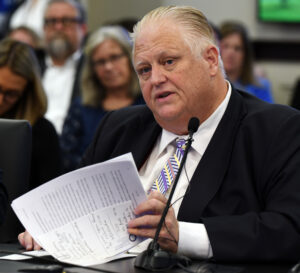18:57
News Story
Lawmakers want to bring Louisville juveniles home
FRANKFORT — While there’s bipartisan support for returning Louisville kids in the juvenile justice system to Jefferson County, at least two Louisville Democratic lawmakers said they would invest in preventive services rather than detention.

The House Judiciary Committee on Wednesday advanced House Bill 3, which provides $8.9 million to renovate and reopen a 40-bed Jefferson County Youth Detention Center.
Sponsored by Rep. Kevin Bratcher, R-Louisville, the bill was approved 15-1 with two passes.
HB 3 also mandates that youth taken into custody for violent offenses be detained for up to 48 hours before receiving a detention hearing and an evaluation on mental health and substance use disorders. “I believe those two things are very important for our most troubled children to try to get their lives turned around,” Bratcher said.
The bill would open records of juveniles convicted of violent crimes and hold parents more accountable for a child’s truancy from school.
Rep. Keturah Herron, D-Louisville, questioned opening now-confidential juvenile records, saying the information could be used by violent gangs, and approving almost $9 million for renovation before assessing the building’s needs.
“If you ask anyone in Jefferson County, we want our kids back in Jefferson County. That is a must,” said Herron. But she called investing in a Louisville detention facility right now “short sighted.”
The city of Louisville had long operated its own facility for juveniles in custody, but closed it in 2020 to save money. Louisville juveniles then entered the state-run system, which has been plagued by violence, unsafe conditions and understaffing, which Republicans have blamed on mismanagement by Democratic Gov. Andy Beshear’s administration.
The Beshear administration closed a state facility in Lyndon in Jefferson County last November, saying it was ill equipped to house offenders, which dispersed more juveniles from Jefferson County to state-run facilities in other counties. On Tuesday, Beshear’s budget chief, speaking to a House budget subcommittee, outlined a $46 million administration proposal for security upgrades to juvenile facilities, an overhaul of ?the state facility in Lyndon, and plans for transportation and continuing the pay increases for staff in juvenile facilities.
Violence and its impact on kids
The House Judiciary Committee heard testimony Wednesday about violence and its impact on juveniles in Louisville. David James, deputy mayor of Louisville for emergency services, said that 30% of homicides in Jefferson County are related to gang violence.?
James said Louisville is asking the Department of Juvenile Justice to operate a state facility in the city and that the city government would provide personnel and finance programming.?
“Because we don’t have a facility for the children now, it is hampering Louisville’s ability to protect its citizens and to protect those children,” James said.?
Josh Crawford, a Louisvillian and director of Criminal Justice Initiatives at the Georgia Center of Opportunity, told the committee that more than 200 juveniles have been shot in Louisville over the past two years. Additionally, 11% of homicide arrestees were juveniles. The national average is 8%.?
Rep. Jason Nemes, R-Louisville, said,“Unfortunately in Louisville, we’ve got to send our kids to Adair County in a situation in a facility with staff that don’t understand our kids, and they’re not ready for our kids. We need them home,” Nemes said.
State Budget Director and Executive Cabinet Secretary John Hicks on Tuesday had expressed concerns about committing $8.9 million before knowing the Louisville facility’s renovation needs. He said Beshear administration officials were in talks with Louisville Metro Government to schedule a walkthrough of the? building.?
Bill of Rights
Earlier Wednesday Herron and Rep. Lisa Willner, also a Louisville Democrat, held a news conference to talk about their House Bill 266 creating a Bill of Rights for incarcerated youth.
The Incarcerated Children’s Bill of Rights would say youth in detention have the right to:
- Be kept safe, informed, and free from emotional, psychological, verbal, and physical abuse;
- Speak with, see, and touch their family;
- Access appropriate medical, mental health, and behavioral health care;
- An education meeting their individual needs;
- A nutritious and healthy diet;
- Be treated with respect and recognition of their dignity and individuality;
- Be free from unreasonable use of seclusion and restraint
- Receive notice of and participate in court hearings;
- Access counsel; and
- Not be judged, blamed, or stigmatized by detention.
Herron and Willner are also working on two companion bills that would establish a citizens group to provide oversight for juvenile justice in Kentucky and create a fund to support community-based services and detention alternatives. That fund would be administered by the Kentucky Department of Juvenile Justice, according to a working bill draft.
“The fund would be able to receive money from state appropriations, gifts, grants, federal funds,” said Willner and would get a head start with an initial $9.6 million appropriation for 2023-2024.
The review board would be composed of at least three people who will serve at least three years, have interest in child welfare and should represent the community they’re reviewing. Additionally, at least two members of the board would need to be in law, medicine, psychology, social work or education, according to a working draft of the bill.
“There has been far too little focus on our kids, and we’re proposing to change that,”? Wilner said.
“There have been reports of kids assaulting one another, staff abusing kids, kids attacking staff,” Willner said. “While these stories are shocking it is not unpredictable that sustained isolation and consistent dehumanizing treatment will lead to some terrible incidents.”

Herron said: “House Bill 3 does not address any of these issues” like mental health and preventative services.
“It does address issues as far as funding for an actual physical facility. But it does not address the issues as it relates to reentry prevention and alternatives to alternatives to detention.”
After HB3 passed the committee, Kentucky Youth Advocates said in a statement that, “Depending on its final form,” the bill “carries the ambiguity of that Chinese spy balloon.”
The advocacy group praised parts of the bill but said it could go further.
“We believe that continuing to give judges discretion regarding youth detention rather than making the course of action to be a legislative mandate – which is expensive, ineffective, and, in fact, increases the likelihood of recidivism,” the statement said, adding support for “preventive focus on programming.”
Our stories may be republished online or in print under Creative Commons license CC BY-NC-ND 4.0. We ask that you edit only for style or to shorten, provide proper attribution and link to our website. AP and Getty images may not be republished. Please see our republishing guidelines for use of any other photos and graphics.
Sarah Ladd
Sarah Ladd is a Louisville-based journalist from West Kentucky who's covered everything from crime to higher education. She spent nearly two years on the metro breaking news desk at The Courier Journal. In 2020, she started reporting on the COVID-19 pandemic and has covered health ever since. As the Kentucky Lantern's health reporter, she focuses on mental health, LGBTQ+ issues, children's welfare, COVID-19 and more.
Kentucky Lantern is part of States Newsroom, the nation’s largest state-focused nonprofit news organization.
McKenna Horsley
McKenna Horsley covers state politics for the Kentucky Lantern. She previously worked for newspapers in Huntington, West Virginia, and Frankfort, Kentucky. She is from northeastern Kentucky.
Kentucky Lantern is part of States Newsroom, the nation’s largest state-focused nonprofit news organization.





